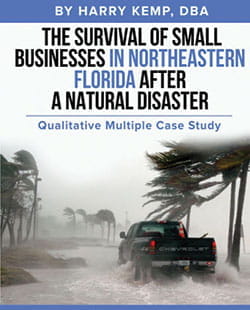
In his 25-year career as a fire rescue captain in Jacksonville, Florida, Dr. Harry Kemp ’16, a Doctor of Business Administration (DBA) graduate, saw his share of small businesses go underwater—literally. “I saw everything from a flood that wiped out a business when a nearby river ran over its banks to a restaurant being struck by lightning, setting the kitchen on fire,” he says.
The common denominator in whether those businesses survived those disasters was whether the owners were prepared. “If you own a small business, that’s your livelihood,” Kemp says. “If you haven’t planned a response, it can be a disaster for you both personally and professionally.”
While working on his DBA, Kemp used his natural disaster experience as a first responder to inform his doctoral study, The Survival of Small Businesses in Northeastern Florida After a Natural Disaster, for which he received the Walden University Frank Dilley Award for Outstanding Doctoral Study.
Now retired from the fire department, Kemp works as a consultant, partnering with small businesses to ensure they don’t lose everything as the result of a natural disaster. As Hurricane Irma crashed into Florida in September 2017, Kemp shared his survival advice for small businesses.

PROTECT YOUR BUILDINGS. If you know a natural disaster is coming, take proactive steps to protect your building and business. That can include installing concrete barriers, surrounding the building with sandbags or inflatable barriers, and laying antimicrobial carpet padding. It’s all about protecting the building where your business operates and the stock inside it.
COVER YOUR BASES. Having insurance to shield your business from the costs of recovering and rebuilding after a natural disaster is vital. Is there a large tree that could fall and prevent customers from coming in? Are you in a flood zone or a high-risk fire area? At a minimum, invest in flood and business interruption insurance, which covers the losses you may experience if you’re not able to do business immediately following a natural disaster. Always have some cash on hand, too. It can come in handy if the power is out for an extended period and you are unable to access ATMs.
FIND YOUR TRIBE. It can take time to collect on insurance. In the meantime, if your business is damaged, you’ll need to move quickly to reopen, and you’ll need a network of people to help you do it. Build a tribe of friends, family, and community members who can help you do quick repairs and cleanup to minimize downtime.
DO YOUR HOMEWORK. No one knows more about how a small business can survive a natural disaster than a business owner who has been through one. Do your research, partner with your local municipality, and find local small-business owners who have been through recent natural disasters. Continually seek the information you need, prepare every year, and have a plan. If a natural disaster hits, you must know in advance how you’re going to keep your business running.



